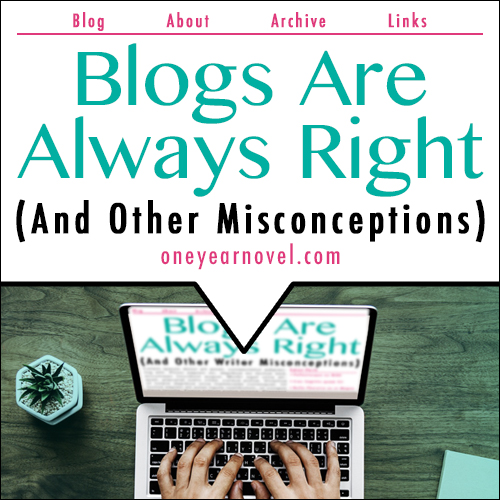Blogs Are Always Right (And Other Misconceptions)
 By Lydia DeGisi, Student Contributor
By Lydia DeGisi, Student Contributor
When I was probably around eleven years old, I read a nonfiction book called Plot by a woman named Ansen Dibell. It was published in 1988, is considered a writing craft cornerstone by no one, and is criticized on Amazon for covering little original ground. I loved it, reading and rereading Plot in the same manner I read novels. This is where I started to learn the facts: You must NEVER “head-hop” between different viewpoint characters within one scene. You must NEVER have more than 20% exposition density. And the plot must ALWAYS come first.
When I was thirteen years old, I began writing my first novel. I didn’t expect to be a bestseller within a year—I went with a more reasonable goal: be published before I’m 18. In fact, I was such a reasonable person that I knew that someone’s first novel almost never gets published, so out of all my ideas, I picked one that could stand to never see a bookshelf. The main character was a 31-year-old gardener who was put in suspended animation for over two thousand years, and when he woke up, he was arrested and sentenced to life in prison for hate crimes against weeds. (Incidentally, all those other ideas I was saving for later have never been touched since).
I discovered writing blogs and literary agent blogs. I soon became an expert in the right and wrong ways to be a writer. You must write messy first drafts, you must write every day, show-don’t-tell, don’t flit around from project to project. I had a few sticking points that I arbitrarily decided to champion: Third person can and should be as deep in the main character’s head as first person! Italicizing thoughts is for losers! Self-publishing can ruin your chances at being traditionally published! Trust me, I know these things—I read a blog by a literary agent.
Over the next four years, I wrote my gardener novel, slowly, so slowly. I would participate in online word wars (competitions to see who can write the greatest number of words in their stories over a day or a set number of minutes) and complain to my mom that I was slower than everyone else I knew. “Maybe your words are of better quality than theirs,” my mom would say.
“Uh, no, Mom, this is a first draft. Everybody knows that first drafts aren’t supposed to be good,” I would say.
“You sure?” she would say.
What does she know? I’d think. She doesn’t even read writing blogs.
When I was fifteen years old, I took a pause while in the middle of that book to do something I’d wanted to do for years: OYAN. After getting the curriculum for Christmas, I gained access to the forum, another platform to tell people my correct opinions taken from blogs. My OYAN was the first book I finished. (It took longer than one year.) I brought it to a couple Summer Workshops. People adored it less than I had dreamed. I went through Story Coaching. I went back and edited most of it, then ran out of time and submitted it to the Novel Contest at 11:59 on the day of the deadline.
I went back to the 31-year-old gardener. The document’s wordcount crept over 140,000. Then, at age seventeen, almost at the book’s conclusion, I scrapped everything and started over at the beginning. I took the new beginning to a Summer Workshop. It turned out to not be particularly good. I had been writing for four years, and only had one book to show for it. Where were all the messy first drafts I was supposed to bang out?
A year later, during a break working at Freddy’s, I had a pen in my hand and a paper napkin under it, and I was determined to have an idea for a new novel by the time I clocked back in. It was the last year I was eligible to enter the OYAN student novel contest, so I had less than a year to come up with the winning book. And, gripping that pen, the idea came—old story ideas to recycle, combine, transform. Over the next few months, I wrote. It was slow. It was weird. It was different from anything I had ever written before. In January, eight months before the contest deadline, I had two chapters, and I had no idea if they were any good. I brought them to my first ever Winter Workshop and was surprised to find, finally, that they were. And one evening during that Workshop, I abruptly thought that maybe, I always wrote so slow because maybe, just maybe, I am not meant to write messy first drafts. Maybe I am not meant to write messy first drafts.
So I wrote, slowly, for the next eight months. I was supposed to get my driver’s license. I didn’t have time for that. I was supposed to pack my things to move to college. I didn’t have time for that. My desperation increased—I wanted to win the contest, never mind, to final, never mind, to be a semifinalist, never mind, to just finish in time to enter. If I finish in five months, I’ll have three to edit. If I finish in one month, I’ll have one to edit. If I finish in a week, I’ll have a week to edit. If I finish tomorrow, I’ll have a day to edit. If I finish this morning, I’ll have all night to edit.
I finished the novel a few hours before the deadline. I submitted it at 11:58, an improvement from the year before. I realized, too late, that the book had multiple inconsistencies, and, worst of all, I’d left author’s notes apologizing for my mistakes in the document. I despaired of my life.
But I had finished.
The months went by, the contest was judged, and finally, on the night of the contest webinar, I was floored to discover that I was a finalist. Then, a few minutes later, Mr. S announced me as the second place winner. It really wasn’t a messy draft after all.
Six years can make a world of difference. I suppose the most obvious takeaway from my life story is to not take blogs too seriously (she said, on a blog), but that’s not quite right—I’ve been helped immensely by writing advice. It would be closer to say I learned not to take myself too seriously. Don’t worship what you think is the correct writing style, or what you think is your writing style—if from now on, I insisted upon writing pristine first drafts forever, that would be just as bad as before.
“I write for the same reason I breathe—because if I didn’t, I would die,” said sci-fi author Isaac Asimov, whom I named a 31-year-old gardener after, six years ago. So I’ll keep writing, keep evolving. I’ll take myself too seriously again and I’ll self-correct. And then I’ll probably take myself too seriously again, and start over the cycle.
But I don’t mind, as long as each time, I grow a little as a writer.
…
What misconceptions have you overcome on your writing journey?
…
About Lydia
 Lydia DeGisi is a college student from Kansas, currently double-majoring in English and Biology. She loves insects, science fiction, history, and walking in the rain. In addition to novels, she also enjoys writing poetry and journaling.
Lydia DeGisi is a college student from Kansas, currently double-majoring in English and Biology. She loves insects, science fiction, history, and walking in the rain. In addition to novels, she also enjoys writing poetry and journaling.


